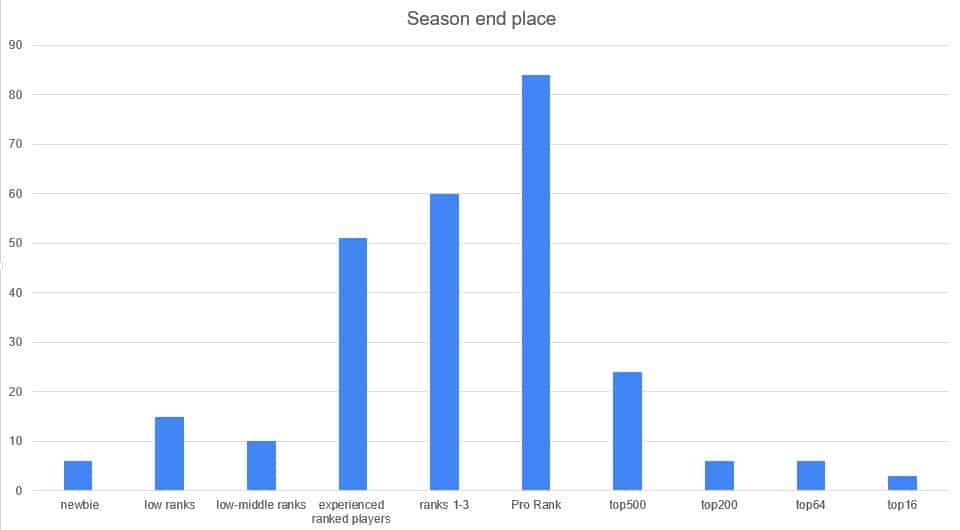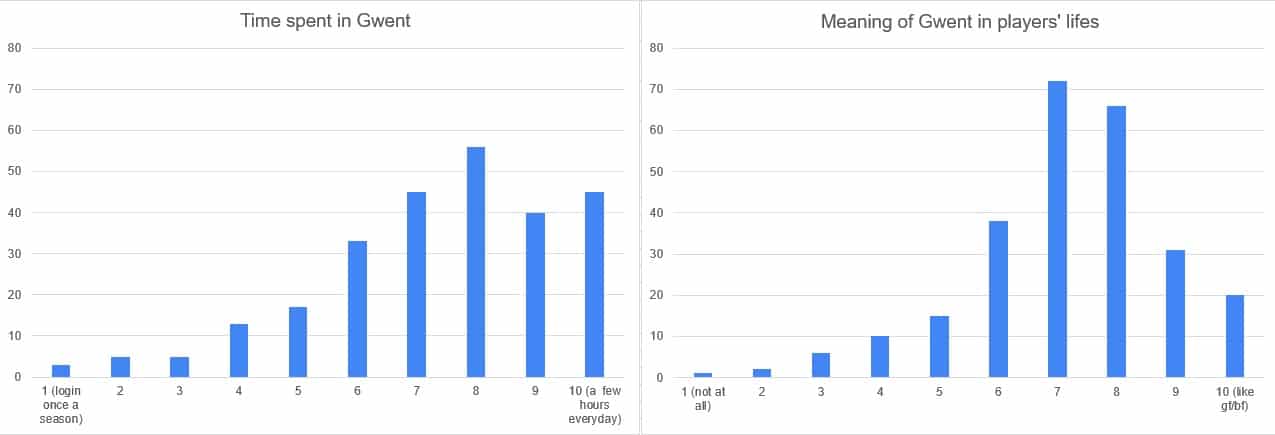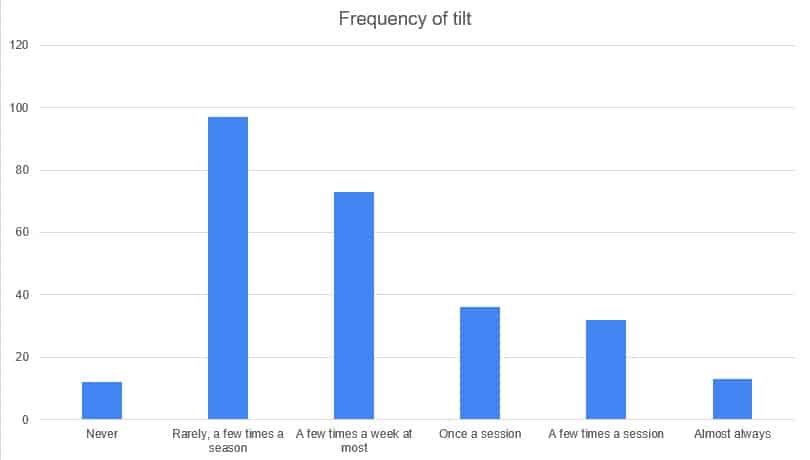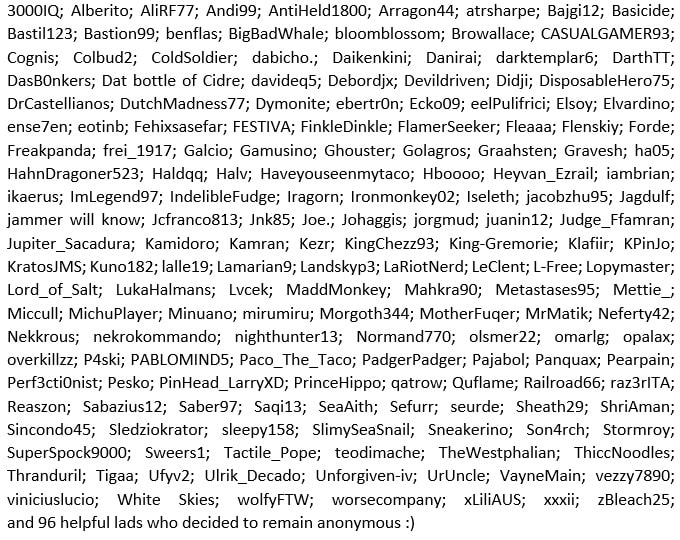Hey everyone, Lorakko here with a new detailed article! I’ve finally managed to go through all your answers to our survey about tilt and ladder anxiety. Over 270 people participated, so it took some time to analyze, but the results led me to some fascinating conclusions and I’ve learnt a lot about the active part of the Gwent community.
Let’s proceed with the results, we’ll begin with general comments, then I’ll share the more specific data about the tilt and anxiety topic. In the end, we’ll have a look at pro players’ response. I’ll include some general numbers in the text and then you can take a look at more detailed graphs.
If you have any questions, feel free to join our Discord. Have a good read!
Table of Contents
Introduction
About half of the community has background in other card games, mainly Hearthstone, Yu-Gi-Oh! and MTG:A. Poker and chess were also mentioned and some people find their university or military background useful on ladder too. Most of the active social media users do well on ladder - an average participant of our survey seems to consistently end their season in Pro Rank or on Ranks 3 to 1 (more than 60% of respondents achieve that).
About 80% of participants play the game regularly (between 6 and 10 on our scale) and about 30% play every day, often for a couple of hours (9s and 10s). Additionally, Gwent seems to be an important part of our lives! 87% of respondents rated it between 6 and 10, and nearly 45% between 8 and 10. For 10% of you, Gwent is as important as your girlfriend or boyfriend.
At the same time, only 33% of participants evaluate how they’re doing (most of those just look at playgwent.com, less than 10% of players analyze their matches or keep track of other details). 66% of the community prefers to enjoy Gwent without overthinking it. Detailed graphs below:
To tilt or not to tilt?
The main topic of our survey was tilt. As most of you know, it’s a state of mind leading to suboptimal plays and overall anger or impatience. Most of Gwent’s player base (nearly 80%) experiences it from time to time, 1/6th of the players tilt every time they play and only about 4% state that they never tilt.
So where does all the tilt come from? About 20% of players bring the anger from the outside world. The game can help them deal with everyday stress, but the in-game performance can be negatively affected by their troubles. Another 20% remain neutral in this field, while 60% of participants have a strong distinction between game and real life, believing that the external factors don’t affect how they perform on ladder.
A similar trend can be observed in how Gwent tilt affects our real life, less than 15% of the players feel that tilt carries over after closing the game, over 70% of players leave the tilt behind upon turning Gwent off and the rest remains neutral.
The reasons for tilt aren’t surprising at all, however we can divide them into 2 groups of origin - the more psychological ones and the more gameplay ones. The first group is related to how we perceive the game and how our brains react to wins or losses. The most tilting factor are misplays, over 80% of participants find them to be the biggest issue, which is actually pretty healthy! The way we resent misplaying helps us become better players - in small doses, of course.
About 40% of answers also mention losing streaks, especially the players who don’t play very often - loss streaks hurt a lot, but we’ll try to find a remedy in a while. The lack of meta knowledge and/or losing to surprise value can be found in about 20% of answers. It seems like we enjoy the predictability of Gwent and the sense of control we have when playing against a well-known deck. If someone takes that luxury away from us, we can get tilted.
The second group is focused on the specific nature of card games in general (or Gwent in particular). Players tilt because they don’t draw golds or tech cards. While Gwent is a consistent card game, you can still miss a key card. Tutor cards help, but the tilt is strong with this one, being mentioned by 75% of players.
Bad RNG is another factor, quite possibly the most hated abbreviation in game history. RNG rolls are a part of the game and Gwent found some nice balance in their prevalence in the meta. That said, every once in a while somebody misses the 90% chance on Shupe or their opponent gets The Great Oak from Bribery and boom - the tilt is back.
Poor game balance is also a popular reason to get tilted. Sometimes - usually after expansions - somebody finds a deck that’s too good. We recently had a crazy season with Hidden Cache, but mentioning Townsfolk, Igor, Dijkstra and Foltest with Blue Stripes Commandos can trigger PTSD in many players. We either have to accept it or take a break from Gwent, CDPR usually deliver a patch in a reasonable time.
Players deem some mechanics to be overtuned, such as Poison. Some abilities or statuses can seem to be too powerful, while the game’s developers perceive them as fine, usually having some statistics to prove that. Nothing we can really do about it except for playing counters.
The last factor I have to mention is almost a category of its own - bad opponents. Most players hate losing to opponents who played worse but got more lucky, play a Tier 1 deck, play uninteractive decks, play cards that make each other worse, like Igni in a Masquerade Ball deck. The sheer existence of such opponents can be very tilting and is mentioned by nearly 95% of players who participated in the survey. Again, you can look at the graphs below:
In the second graph, 1 means “not at all,” while 5 means “totally yes.”
Ladder anxiety
Apart from tilt, there is one more possible negative effect we often experience while playing - ladder anxiety is basically the fear of starting another game because if we lose, we lose some progress. It mostly affects the Pro Rank players (only about 4% of normal ladder players mentioned it) due to a slightly different nature of its ranking system based on fMMR, not on mosaic pieces. The higher your MMR and the later into the season, the more anxious you can become.
Such anxiety hits about 50% of the players, but each case is different - for example there were answers that mentioned anxiety before the first game of the day, then it goes away. The two things that appeared most often were:
- Insecurity when achieving new personal records. This was the type of anxiety mentioned both by regular ladder and Pro Rank players - if you’re on your best rank/fMMR ever, you’re afraid to drop down and you might be a little afraid of the better opponents ahead.
- The season end (cut-off) anxiety. This applies to Pro Rank, as the competition there is between the players directly. Only the Top 500 stay for the next season, the Top 64 can fight for tournaments etc.
The best way to overcome ladder anxiety is remembering that at the end of the day, Gwent is a game, it’s supposed to please, not terrify us. And after this season there will be another, you’ll improve as a player and you’ll eventually broaden your ladder horizons more and more.
Tips and tricks
Probably the most awaited part of the article. I’ll start with some general thoughts that emerged when I was evaluating the survey, basically wisdom of the crowd. Then we’ll look at how some of our best players deal with tilt and anxiety.
- Evaluate your performance! I’ve made a few comparisons and people that analyze their games are not only less prone to tilting than their non-analyzing counterparts, but they’re also higher on the ladder. If you want one magic trick on how to improve your performance, here it is: after every game, take a minute to analyze what you and your opponent could have done differently, and after every session check your match history on playgwent.com and try to evaluate your strengths and weaknesses with and against different decks.
- Take a break! Many of you already know that when you lose 2 or 3 games in a row, it’s better to stand up, go for a walk, listen to some good music, grab a snack - the possibilities are endless and you can easily find what works best for you. The important thing is: you have to break the cycle. When you feel tilted and start misplaying, it will only fuel your tilt, making you misplay more, making you tilt more, repeated to insanity. Taking a break will make your experience and performance much better, trust me.
- Change the game mode or the game itself. Ladder is tilting, so how about you play some Arena or Seasonal mode? The beauty of this method is that you still make use of your collection and can appreciate the amazing art on cards. You can also try changing the pace of things, many people mentioned playing 1-2 matches of different card games. From my experience, I'd recommend changing the pace with a shooter or a racing game, it can make wonders with your attitude towards Gwent.
- Find people who feel the same. Twitch chat and a lot of Discord servers are wide open for the poor souls who need to share their frustration. Knowing that you’re not the only unlucky and unhappy player in Gwent can really help you to deal with it and move on. You’ll probably find some new friends too, an absolute win-win situation.
- Try to imagine what somebody who you really respect would do in that situation. I’ll just quote the most wholesome answer in the whole survey: “I ask myself if Paja would be proud of my performance.” With that said, let’s see what our pro players have to say.
Pro players’ tips

As for ladder anxiety, he says, “I do feel insecure sometimes. I’m afraid to tank my scores and drop from my peaks, which stops me from playing more games when I’m doing well.”
His best way of dealing with tilt involves his teammates - malding together is easier to handle. To sum it up: “I wish I could stop taking breaks when I’m doing well and start taking them when I’m tilted. The hidden names and fMMR really made ladder experience worse for me, as it encourages people to play weird cards and farm surprise value.”

“The thing is, only one player is given a winning line at the beginning of each game. In theory, the player with the winning line will always win if both players play perfectly. This means that you can easily play perfectly and still end up losing and the worst thing you can do if that happens is to rush to a conclusion about how you should have pushed more or passed earlier, when that play would have in fact decreased your winning chances even more. So to sum this up, I try to identify why I lost a particular game and compare it to some of the games I have had against the deck where I had actually won. This is a continuous process which should help you improve a lot as a player.”
Saber usually doesn’t tilt, but if he does, he takes a break, “I handle lose streaks well, as long as I can see what went wrong. I can sometimes tilt a little if my opponent whom I can’t see the name of until after the game (thanks CDPR) plays some weird card that you usually wouldn’t play around. I feel like the current situation benefits clown cards a little bit too much. The only thing that really tilts me is losing because of the bug that results in a random loss right in the queue.”
As a very consistent ladder player, Saber likes to share his strategies on Reddit by the end of the season, you can check his latest thread here.

second best German player in the community, famous for his efficiency, has a lot of background. He played Heartstone, Artifact, Duelyst and competitive chess for over 7 years. He has an interesting approach towards laddering, “I use the first 2 weeks to do placements and analyze the meta, then I’m focusing on one faction at a time up to certain milestones. It’s always dependant on the meta of the day, whoever else is playing at a given time and what faction I feel like playing the most.” Ladder anxiety isn’t much of an issue for him, however it presents itself by the end of the season sometimes.
“In general, when my performance is very good, I sometimes feel pressured to keep it up, which tends to stop me from playing as much as I might want to.” He rarely tilts, if it happens it’s because of misplays or, seldom, bad draws - then he takes a break. Usually, he tries to concentrate on the next game to let his focus override his annoyance.
Gravesh believes that, “The most important thing is to be self-aware concerning your tilt level and to stop yourself from playing whenever tilt starts to affect your performance. It’s easier said than done, but I think controlling your emotions while playing is one of the most important aspects of any game that you aim to play competitively.”
He has a secret strategy to share with all of us, “Why care about tilt when you can just draw your golds?”

To calm your nerves, Chezzy would recommend taking a break or doing a co-op session with a friend. He understands that overcoming tilt can be a struggle despite being aware of the issue, but he keeps trying and so should you!
TLG’s content team (represented by Atrsharpe, DevilDriven, Jagdulf and Minuano): Not quite your usual definition of “pro players,” but these guys have a great knowledge of the game and provide a lot for the community, this time it’s some tips on how to avoid tilt:
Try a different mode (Seasonal, Arena), watch streams or videos, take a day off, listen to some music and/or go to the gym. Take your mind off of Gwent or change the way you interact with it. Sharing frustration with friends can help. At the end of the day, “It’s only a game.” A shout-out to all those who stick with Gwent for better and worse, you’re the best.
Summary
Tilt and anxiety are a part of the game, but at the same time they indicate the path to achieving your goals. If you’re having trouble dealing with them on your own, join our Discord, raid our streamers or hit me up in private messages.
Huge thanks to everyone who participated in the survey, you’ll find your name on a screenshot below. Yours, Lorakko






